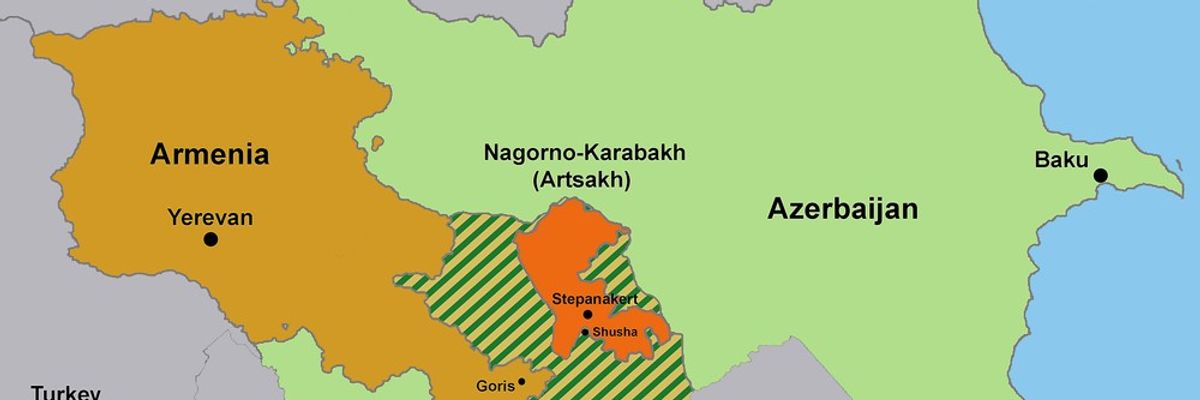On the night of September 12, the Azerbaijani army launched a wave of attacks against Armenia. These went well beyond the Armenian-backed separatist region of Nagorno-Karabakh, but attacks on Armenia itself — representing a drastic escalation of the 30-year-old conflict between the two countries.
Azerbaijan has claimed that it was provoked by Armenian shelling. According to news Wednesday night, both sides have come to a ceasefire agreement, though the Associated Press has reported protests in the streets of the capital, "accusing Prime Minister Nikol Pashinyan of betraying his country by trying to appease Azerbaijan and demanding his resignation."
Early analysis suggests that stalled negotiations on the resolution of the Nagorno-Karabakh issue and Russia’s distraction in Ukraine are the driving forces behind Baku’s decision to strike now.
The latest fighting shows the frightening potential for the war on Russia’s periphery to spread. Far greater diplomatic engagement by the United States and the West is necessary to stop this from happening.
Secretary of State Antony Blinken, who held a phone call earlier this week with Pashinyan, was ambiguous about who Washington holds responsible for the outbreak of violence. The State Department said the secretary had expressed his “deep concern over the military actions along the Armenian-Azerbaijan border, including reports of shelling in Armenia.”
The secretary stressed the need for disengagement of military forces and assured Prime Minister Pashinyan that the United States would push for an immediate halt to fighting and a peace settlement between Armenia and Azerbaijan,” according the statement.
What Blinken and other Western officials fail to acknowledge so far is that these hostilities are the direct result of Baku’s confidence in using force to resolve an issue that other parties believe requires a diplomatic solution. While Blinken also spoke with Azerbaijani President Ilham Aliyev, very limited public pressure has been applied, although he urged Aliyev “to cease hostilities.”
The 2020 Nagorno-Karabakh War saw a similar lackluster response across Western institutions and their respective capitals. The war resulted in a Turkish-backed and armed Azerbaijan reclaiming most of the Azerbaijani territory held by Armenians since the First Nagorno-Karabakh war of the early 1990s, as well as taking control of parts of Nagorno-Karabakh itself.
The hostilities abated with a Russian-brokered ceasefire and the deployment of 2,000 Russian peacekeeping troops. However, negotiations over various steps in the implementation of the ceasefire agreement have slowed recently, much to Baku’s displeasure, and no progress at all has been made in negotiations on the political status of Nagorno-Karabakh.
Over the last month, increased Azerbaiijani military activity on the border with Armenia had raised fears in Yerevan that something larger was brewing. With the Russian military tied down and suffering heavily in Ukraine, little to no response from the West, and a newly minted EU energy deal that highlights European dependence on Baku’s plentiful energy resources, Aliyev apparently saw few obstacles to his plan to circumvent diplomacy and resort to direct intimidation and aggressive military advances.
Azerbaijan has received massive help from Turkey — which remains a NATO member that hosts a major U.S. air base at Incirlik.
France (which, like the United States, contains a large Armenian-origin community) has already stated that it will bring this latest conflict to the United Nations Security Council, a conversation the United States should encourage and support with the intention of ensuring peace and stability throughout the region alongside a lasting settlement to the Nagorno-Karabakh conflict.
The renewed fighting in the Caucasus at this time is certainly not in Moscow’s interest. But nor is a new war between Armenia and Azerbaijan in the interests of the United States, if only for the precedent it may set for other countries, particularly along Russia’s periphery, to use force to achieve their own territorial ambitions against their neighbors. The most immediate threat is that Georgia will repeat its attempt of 2008 to regain its lost territories of Abkhazia and South Ossetia by force. As if on cue on Tuesday, the ruling Georgian Dream Party said it may organize a nationwide referendum on instigating a war with Russia, according to a statement made during a briefing by its chairman Irakli Kobakhidze.
That would certainly lead to a massive new international crisis. Should Russia prevail (which, despite Russia’s losses in Ukraine still seems probable, given the immense disproportion of Georgian and Russian resources), Washington would be faced with the choice of abandoning a country it has described as a key partner or opening a new front against Russia.
This is an urgent moment, and proponents of a diplomatic solution between Armenia and Azerbaijan must come forward to work towards a lasting resolution to a conflict that has taken far too many lives in the more than 30 years since fighting initially broke out.
Editor's Note: Artin Dersimonian was an intern at the Armenian Embassy in Washington in 2018. The Terjenian-Thomas Assembly Internship Program at the Armenian Assembly — which is mentioned in the QI brief on which this article is based — facilitated Dersimonian's internship with the embassy.














